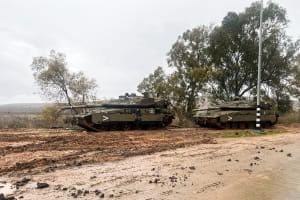US sees ‘no reason’ IDF should remain in Lebanon, as Israel reportedly weighs staying ‘for years’ in some areas
Biden admin warns Israel against reputation that it doesn’t live up to commitments

With the 60-day mark in the ceasefire between Israel and Hezbollah fast approaching, the Israeli army continues to hold most of its positions in southern Lebanon, with reports suggesting that the government is considering extending its presence in some areas.
According to a Channel 12 report on Tuesday, sources in the cabinet even said that the Israeli army might not withdraw “for many years” in some places.
Under the ceasefire agreement, the Israel Defense Forces must complete its withdrawal from southern Lebanon at the end of 60 days, while the Lebanese Armed Forces (LAF) must assume control of the vacated positions and deploy throughout the area. Meanwhile, Hezbollah forces are supposed to withdraw north of the Litani River.
After Amos Hochstein, the White House envoy who brokered the deal, visited Beirut on Monday, an American source told the Jerusalem Post that the U.S. believes there will be “no reason” for the IDF to extend its stay in Lebanon.
Israeli officials so far haven’t threatened to stay beyond the ceasefire period, but several reports have suggested the government is seriously considering the issue.
The main argument cited by Israel has been the slow pace of the LAF’s deployment. To date, only three areas have been taken over by the Lebanese army, including the western area around a-Naqoura this week.
On Sunday, Israeli officials told the JPost that at the current pace, Israel would have “no option” but to stay for up to two more months. However, American sources said the LAF has sped up its deployment.
“The IDF implemented a withdrawal from the western sector yesterday due to the Lebanese Army deployment in the area,” the source said. “The US administration and other regional players are now on getting the conditions right for the next withdrawal phase.”
“It’s very important for Israel not to have the reputation that they don’t live up to the commitments,” the Biden administration warned Israel, according to another U.S. source cited by the JPost.
According to Channel 12’s report, there is another reason Israel is considering staying longer. The ceasefire agreement stipulated that “terror infrastructure” in southern Lebanon will not be rebuilt, but did not clearly define the term.
While Lebanon wants to distinguish between the villages and the terror infrastructures themselves, Israel argues that the myriad of houses and other buildings used by Hezbollah as ammunition depots or as a staging area, for example, should be considered infrastructure and not be rebuilt.
This is especially important within several villages located very close to the Israeli border and which partially overlook several Israeli towns. Several of these villages were almost completely destroyed, and Israel may seek to prevent their restoration.
Earlier this week, Finance Minister Bezalel Smotrich said that “there are things he refrains from saying for 15 [more] days,” likely alluding to the inauguration of President-elect Donald Trump on Jan. 20.
The Channel 12 report speculated that this cryptic comment suggested that Israel would make its demand in a public statement only after the Biden administration departs.
On the Lebanese side, claims of a slow LAF deployment have been countered by accusations that the IDF is withdrawing too slowly.
In Lebanon, there are claims about the slow deployment of the LAF, with accusations that Israel is to blame for the fact that the rate of deployment matches the pace at which the IDF withdraws from the region.
Channel 12 cited Lebanese sources warning that if Israel stays, “it will face complications and a significant problem.”

The All Israel News Staff is a team of journalists in Israel.
You might also like to read this:
















